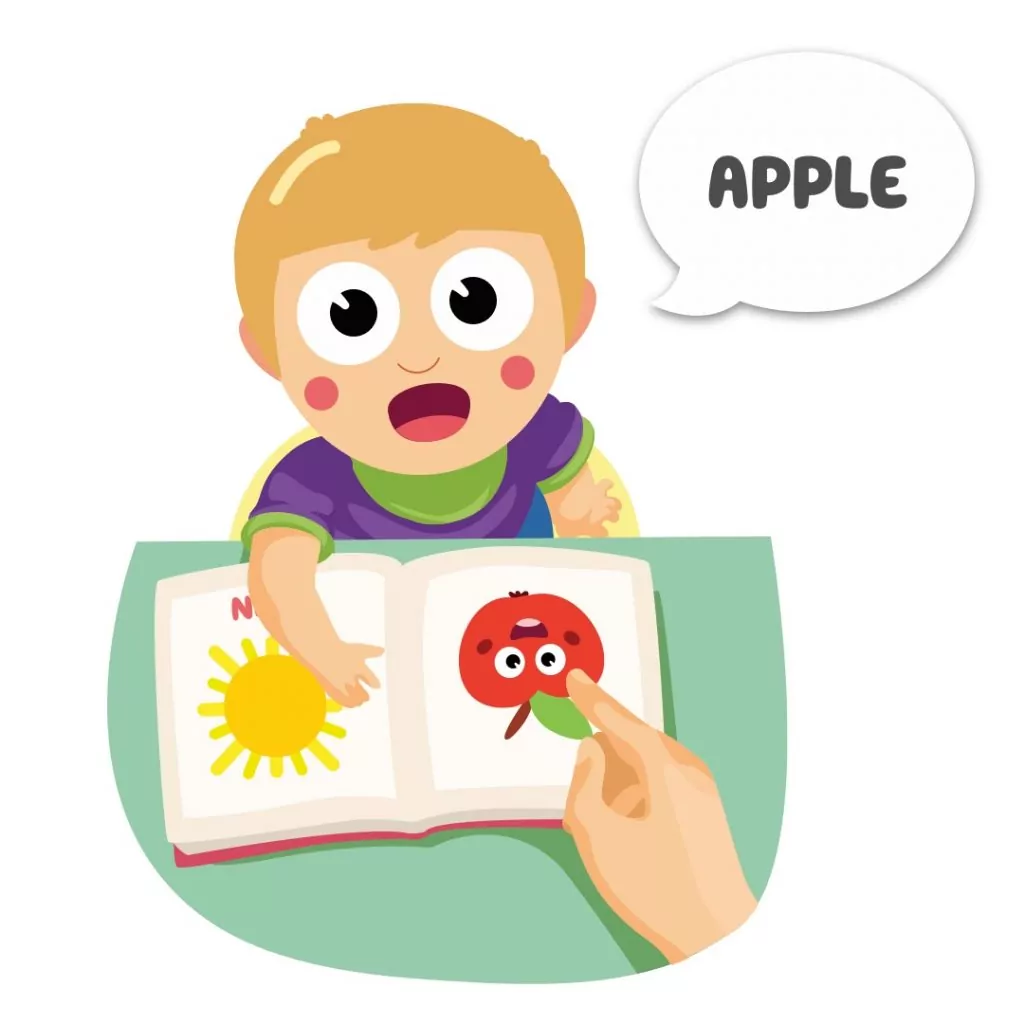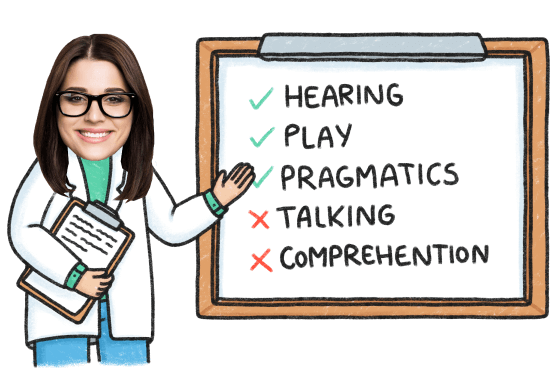Typical Speech Development: Vocabulary Milestones by Months
Jan 26, 2022 Getting feedback or results from a speech therapy assessment is often confusing for parents, simply because there are a lot of technical terms that speech therapists use to describe certain aspects of language and their associated disorders.
One of these words is “semantics,” which is merely technical jargon for “vocabulary.” But, what exactly is vocabulary?
Vocabulary refers to the set of words found in language that your child knows. Vocabulary can be split into two types:
- Receptive Vocabulary: Consists of the words your child understands when they hear or read them;
- Expressive Vocabulary: Consists of the words your child uses when they speak or write them.
Vocabulary develops as your child grows, and serves as both a useful and basic tool for communication and building knowledge.
Why is Vocabulary Important?
Simply put, vocabulary is the basis for learning a language. In fact, research has shown that a child’s vocabulary in the early grades is related to reading comprehension in the upper grades:
- Preschool – Children’s vocabulary is connected to reading comprehension in upper elementary school (Tabors, 2001).
- Kindergarten – Vocabulary size is an effective predictor of reading comprehension in middle elementary years (Scarborough, 1998).
- First Grade – Orally tested vocabulary was a good predictor of reading comprehension 10 years later (Cunnningham and Stanovich, 1997).
- Third Grade – Children with lower vocabulary have falling comprehension scores in later elementary years (Chall, Jacobs, & Baldwin, 1990).
As they develop, children typically understand or recognize more words than they use when speaking.
Vocabulary Developmental Milestones

0 – 6-Month-Old Baby
- Cries for assistance
- Makes more guttural or “throaty” sounds
- Coos single syllables and mostly vowel sounds
- Responds vocally to the speech of others
- Babbles strings of consonants
- Changes pitch, volume, and rate
- Imitates and experiments with tones and sounds
- Vocalizes and squeals in response to toys, pleasure, and displeasure
7 – 12-Month-Old Baby
- Plays vocally
- Produces several sounds in one breath
- Repeats emphasized syllables
- Produces distinct intonational patterns
- Imitates non-speech sounds
- Uses jargon
- Imitates adult speech if they can make the sounds
- Imitates tonal quality, inflections, and rhythms of adult speech
- Understand new words every month
- Speaks one or more words
- Understands approximately 50 words
- Mixes words and jargon
13 – 18-Month-Old Toddler
- Uses jargon and words in conversation
- Begins to use two-word utterances
- Has about a 20-word vocabulary
- Names some body parts
- Refers to self by name
- “Sings” and hums
- Plays question-answer with adults
- Repeats words heard in conversation
- More words are understood than are spoken
- New words are being understood at a faster rate
- Has a 4–6-word expressive vocabulary at the beginning of this stage and moves towards a 70-word expressive vocabulary at the end of this stage
- Has a 150–350-word receptive vocabulary
Boost Your Child’s Speech Development!
Improve language & communication skills with fun learning!

19 – 24-Month-Old Toddler
- Likes rhyming games
- Tries to “tell” experiences
- Uses “I” and “mine”
- Begin to combine words to uses short, incomplete sentences
- Has a 600 – 700-word receptive vocabulary
- Are adding approximately 70 new word meanings to their vocabulary every month
- Has a 200 – 300-word expressive vocabulary
3-Year-Old Toddler
- Creates three- to four-word sentences
- Plays with words and sounds
- Talks about the present
- Has a 900 – 1,000-word expressive vocabulary
- Will continue to add almost 70 new word meanings to their vocabulary every month
4-Year-Old Toddler
- Asks many, many questions
- Recounts stories and the recent past
- Has 1,500-word expressive vocabulary
- Will continue to add almost 70 new word meanings to their vocabulary every month
5-Year-Old Child
- Discusses feelings
- Has learned 90% of grammar
- Has a 2,100- to 2,200-word expressive vocabulary
- Will continue to add almost 70 new word meanings to their vocabulary every month
6-Year-Old Child
- Has a 2,600-word expressive vocabulary
- Has a 20,000- to 24,000-word receptive vocabulary
How to Encourage Vocabulary Development

Learning new words can be tricky, as there are lots of things that children have to be able to do to understand and say a new word and get it right. In fact, your child needs to:
- Remember the sounds they hear;
- Remember the order of these sounds;
- Put these sounds together to make a word;
- Understand what the word means;
- Work out where in a sentence the word goes to understand its full meaning.
Luckily, there are many things you can do with your child to help them build and develop their vocabulary.
The United States Reading Panel has the following suggestions when targeting your child’s vocabulary:
- Vocabulary should be taught both directly and indirectly;
- Repetition and multiple exposures to vocabulary items are important;
- Learning in rich contexts is valuable for vocabulary learning;
- Vocabulary learning should entail active engagement in learning tasks;
- Dependency on a single vocabulary instructional method will not result in optimal learning.
Bearing this in mind, here are some activities that you can do with your child to help their vocabulary development:

- Read to your child. A variety of books is best, and the more books, the better!
- Talk to your child about the environment around you and make sure that you use different settings to expose them to as much vocabulary as possible
- Encourage your child to tell you about their day. Ask them open-ended questions and prompt them if you can see that they are struggling
Play rhyming games. Children love nursery rhymes and sing-along songs
. . . and Some More Vocabulary Activities:
- Watch what your child is doing and say the name of the object or action. You can even encourage your child to perform a particular activity to target vocabulary that you know they are experiencing difficulty with
- Repetition is crucial, so make sure you say new vocabulary words a few times to help your child remember them
- Play developmental games that are centered around building childhood vocabulary
- Talk about how words are linked together and how they link to words they already know. For example:
- The words could be similar in meaning (tall, high, long)
- The words could be in the same category (cat, dog, hamster)
- There are different types of words and children need to learn them all, so you need to make sure that the vocabulary they are learning includes:
- Doing words/verbs (walking, swimming, jumping)
- Describing words/adjectives (big, heavy, red)
- Naming words/nouns (dinosaur, chair, juice)
That’s It! Just about any activity can be used for speech therapy, and in combination with the Speech Blubs App, you and your child will be able to have fun while doing so.
Have a question for our Speech Therapists?


My son is 22 months old and can’t speak words other than mama, papa, dada, nana and car
He doesn’t respond to his name
But he is expressive through gestures like if he wants us to pick him he’ll raise his hands but does not point fingers
He understands no
He very rarely makes eye contact with us and is hyperactive
Also he started crawling and walking also quite late when he was 17months old
Please suggest me something I am very worried if he has speech delay or autism and will he be fine
Hoping to get a positive response from you
Thank you
The first thing I would recommend for you to do is to try and take a deep breath and know that, no matter what the diagnosis, everything will be alright! At 24 months, children should be able to say around 50 words, phrases and short two-word sentences. Anything less than this could indicate a speech and language delay. Now – based on your question, you said he is attempting to communicate verbally AND with gestures, which is great. We want to work on the pointing and pairing those gestures with sounds. Secondly, I would like you to try and find a speech pathologist to work with. This therapist will work on communication and be able to tell you, after working with him, if they think there are any other issues. Thirdly, if you think he is hyperactive, you might want to check out a neurologist to rule out attention deficit disorder.
Stacie Bennett, M.S. CCC-SLP
My daughter is 2 year 3 months now. She can speak some words like “bye bye, see you, 1,2,3,4” but can’t make complete sentence. Is there any cause of alarm? What can be done to help her develop speaking skills?
Thank you
At two years of age, your daughter is doing what she is supposed to be doing. Most two year olds are able to complete phrases and will start to formulate short sentences. Those sentence might not always be grammatically correct, but she will communicate in a more “adult-like” form, as opposed to short, choppy phrases. In order to foster the development of sentences, you should be modeling (giving examples) of short sentences. For example, when doing an activity together, say things like, “The dog is in the yard,” or “put the cup in the water.” I’m also a huge fan of reading to children. This will give more examples of how sentences should be formed, but in a colorful and fun way!
Stacie Bennett, M.S. CCC-SLP
Hello
I was wondering if u can help me with my little brother’s speech problem. He just turned 4 and I can say he doesn’t speak at all, but he does make some noises …. and tries to repeat the words we say. We did take him to the doctors and they checked his hearing and so on…and told us he will talk eventually, but he’s still not talking and we don’t know what to do. If you have any suggestions for us we would very grateful.
First of all – any doctor that tells you that a child will talk eventually, makes me extremely leary… At four years old, a child should be able to communicate in full sentences and be understood almost 85% of the time. If he is not speaking at all, I strongly urge you to seek out a speech-language pathologist as soon as you can. Not being able to communicate will severely impact his academics and his ability to communicate his needs/wants to his teacher and friends!
Stacie Bennett, M.S. CCC-SLP
My 2 year old (just turned 2) only has about 20 words & doesn’t imitate words we say.
He is only just putting words together “hi mom”, “all gone” but doesn’t repeat words after us
Is this normal?
The first thing we look for as speech therapists is if children can imitate. Imitation is the first indicator that children will learn language successfully. With that being said, just because they don’t always imitate, doesn’t mean there’s a speech and language issue. At two years old, children typically say around 50 words and short phrases. That doesn’t mean they will say 50 words by their second birthday; it means that by the end of their second birthday, that’s how many words they should say. The phrases will also grow in length and turn into sentences. If you have concerns, I’d recommend getting screened by a speech therapist.
Stacie Bennett, M.S. CCC-SLP
My 2 year old understands everything I say, but only says yes or no. Is she just lazy?
This is a question that I get frequently asked. If a child only has a few words, it does not mean that they are lazy. I’m not sure if she has any other words, but if she doesn’t, then I would recommend looking into early intervention services until she is three and then seeking a private speech pathologist to assist with more language and vocabulary growth.
If she has a bigger vocabulary and is just choosing to say “yes or no,” then welcome toddlerhood! Yay, so much fun! This is where they start to enjoy independence and pushing boundaries. My daughter is 3.5 and there are some days where she is a chatterbox and some days where I get one-word replies.
Stacie Bennett, M.S. CCC-SLP
How can I help my 2yo understand what we’re asking/telling her?
I need some more clarification in order to answer your question. What does your child do to indicate that she isn’t understanding? Does she ignore you? Is she doing the wrong things? Please let us know so that I can help you more.
Stacie Bennett, M.S. CCC-SLP
I have a son and is 3 and a half in fact in 2 months he will be 4years but the issue here is.. he’s not talking the way he should, everything else is normal… he is hearing properly… understanding everything but he find it hard to communicate and he is so rough and too hyperactive. and anytime he’s asked to say something he won’t pay attention to your teaching… pls I’m really worried don’t know if is normal for some kids cus I don’t know what else to do have tried every method with him but nothing has changed…pls suggest me something that I can do with him to help me communicate.
So there sounds like there are two things going on here: attention and communication. These are two separate issues that need to be addressed because they will impact each other.
1. Attention – if you feel like your son cannot maintain attention, you need to get him seen by a neurologist. The doctor will determine if there is an underlying attention deficit disorder that is impacting him. This is important to do as soon as you can and definitely before he enters the school system. If he can’t focus in school, he will have issues with learning and might fall behind in his academic performance.
2. Communication – At four years old, children should basically be communicating in full sentences and able to tell short stories. Their ability to be understood is about 85%. If he isn’t saying full sentences and isn’t easily understood, I would suggest seeking out an evaluation by a speech-language pathologist. The SLP will work with him on expressive himself and also make sure that he is understanding everything you are telling him.
Stacie Bennett, M.S. CCC-SLP
My daughter is 21 months old. She says mama, dada, piggies (for toes), and a few other little approximations. But no where near 50 words. She is extremely social, wonderful eye contact. She follows directions really well. She points and waves. Has a range of facial expressions. She babbled a little on the later side but my pediatrician wasn’t concerned. I’m wondering if maybe she just needs more time, she babbles a ton and does “back & forth” conversations a lot with us, just in her own little language. I just don’t want to delay seeing a therapist if I need too…
Your daughter and my son are almost the exact same age! First things first, 50 words is an average number of words, but we look for children to meet the milestone of 10 words by the time they are 18 months of age. These “words” can also be approximations so make sure you include them into your word count. Also, does she gesture? Try and get your attention? Those are all examples of communication. Can she say a variety of vowel sounds? I would suggest getting a speech and language evaluation by a private therapist. They can work on increasing her vocabulary more so that she meets the next milestone of putting words together in a timely manner. Just because they pick her up on their caseloads, does not mean she has a disorder. Private practices have much more leniency when it comes to working with kids and it doesn’t mean she won’t ever speak. I hope that helps!
Stacie Bennett, M.S. CCC-SLP
Good day, my son is three, can read (might not understand exactly what he’s reading…but know the words), he even tried to pronounce new words just based on how he knows the sounds, he plays “ok” with other children (sister/ cousins), knows at least 7-8 dinosaurs, all his shapes, alphabet (can even say them backwards) counts backwards… knows all his colors…however, still on the so -so when it comes to communicating. He repeats a lot and asks for things , but still have to remind him to say “I want…”. He labels EVERYTHING tho and knows what he’s asking for or what he wants. He has been evaluated and is taking speech therapy but I feel there can be more help for him. He gets it 30mim for 2 days a week only. We talk to him, play, read together.
It sounds like he’s well on his way! If he is able to say all of the things that you said and is showing progress, that means the speech therapy is working. 2 days a week is great! I know it seems like it’s not enough, but that’s why we always tell parents that they need to work on skills at home, too! It also sounds like you are doing EVERYTHING you can do to make sure he is communicating. Unfortunately, these things can take time. Try and be patient and keep doing what you are doing!
Stacie Bennett, M.S. CCC-SLP
If a 21 month old has about a dozen expressive words but babbles excessively, almost to the point he seems to have his own language. But none of his babble is understandable. Is that handled by a speech evaluation?
I always tell parents to trust their instincts with this one. It’s very hard for me to know what your child sounds like without seeing him/her, BUT I will say babbling is great because it’s always a precursor to language and actual words. I would wait until your child turns 2. If you don’t hear any more intelligible words, then I’d recommend a speech evaluation. There’s typically a large language burst around the age of two and with all of the babbling, he/she might be gearing up for that burst!
If you’d like to talk about it further, please write to ask-a-therapist@speechblubs.com! Thank you!